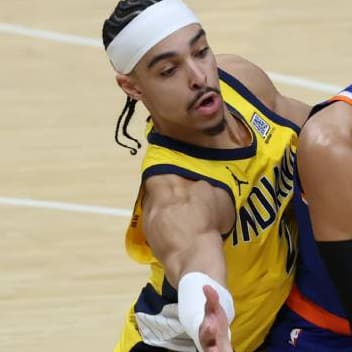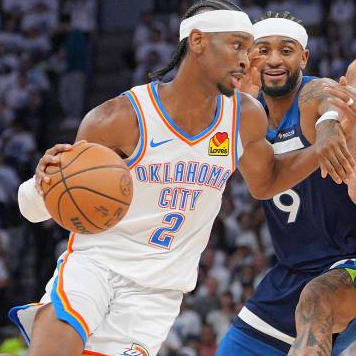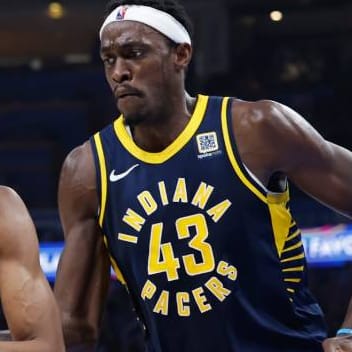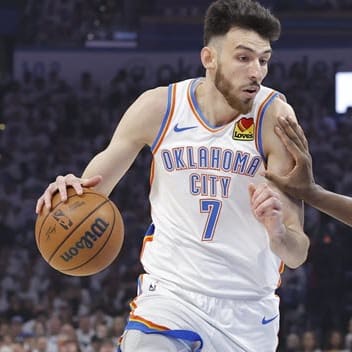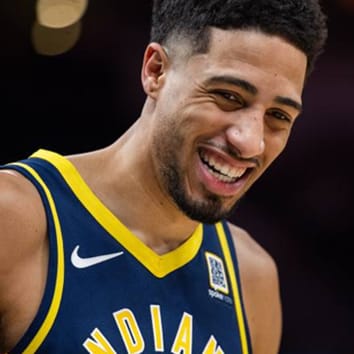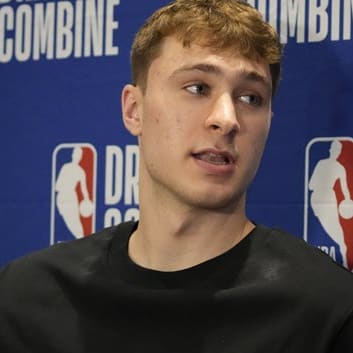This article is part of our The Give and Go series.
The Give and Go
By Charlie Zegers and Carson Cistulli
RotoWire Staff Writers
From: Charlie Zegers
Sent: Monday, January 18, 2010 8:34 AM
To: Carson Cistulli
Subject: Give and Go: The Skill of Staying Healthy
We closed out last week's column talking about Kevin Martin and the Sacramento Kings. You said:
One thing we might not always consider in basketball - but which has become more or less commonplace among baseballing nerds - is the fact that staying healthy is a skill. It's a skill that Martin has not demonstrated to an acceptable degree.
That bugged me all weekend. Or, at least, during those portions of the weekend that I wasn't celebrating the Jets' improbable win over the Chargers.
I accept the basic premise that avoiding injury is something NBA players can work at -- improving their conditioning, eating better, getting appropriate amounts of rest, etc. I'd bet players' post-game habits have a much larger effect on performance than the average fan might think.
For example: Chris Duhon has the reputation of being… something of a night owl. It's not something you hear about a lot in the press, but it came up as a concern when the Knicks first signed him, in a "how will this guy, who clearly loves the nightlife, hold up in New York?" context. Last season, Duhon really seemed to break down in the second half, and based on his last couple of games, it may be happening again. Mike D'Antoni's short rotation and the Knicks' lack of depth at point guard are probably the biggest factors in his second-half decline - but I can't help wondering if "too much time at the 40/40 Club" isn't partly to blame.
I'll even accept that players can adjust some of what they do on the floor in an effort to avoid injury. Hockey analysts used to say Wayne Gretzky had an almost uncanny ability to sense when hits were coming and adjust his positioning to avoid the worst of 'em. (Of course, hockey analysts regularly credited The Great One with otherworldly powers...) I've also heard stories about certain big-time centers being taught not to dive for loose balls, on the theory that having Shaq healthy for 80 games trumps one saved possession.
What I'm wondering is, can we quantify that skill in a way that's useful to fantasy players?
Obviously, there are certain players that get hurt every year. Last week we talked about Kevin Martin. Yao Ming and Marcus Camby and Manu Ginobili are right up there on the list of "guys who are an even-money bet to miss 20 games." T.J. Ford's injury history is absolutely terrifying. Everyone knows those guys are major risks, and that risk is priced into their fantasy value.
But what about guys like Greg Oden and Michael Redd and Nene and Danny Granger? They've missed major amounts of playing time, but their injuries (and in Nene's case, illness) strike me more as simple bad luck. Sometimes, you move the wrong way, a joint bends in a way nature didn't intend, and ligaments tear or bones break. The fact that it happens once doesn't necessarily mean it'll happen again. Back injuries, on the other hand, are particularly scary - which, in my eyes, is going to make Danilo Gallinari a question mark for the rest of his NBA career, even if he never misses time with back problems again. How much do you weigh the type of injury when considering whether or not a given player is a real risk?
And what about the Kevin Garnett/Allen Iverson types? A couple of years ago, the only way to keep Iverson out of a game was to duct-tape him to something heavy. (Like a Buick.) Now the condition of his knees makes him, basically, a day-to-day player. KG was an 80-game guy. Now, he's a "60 if you're lucky." At what point do you start worrying about the number of games you'll get from a veteran player - even one with a history of durability? How much longer can we expect Kobe Bryant to produce at this level - through broken fingers and all sorts of nagging injuries - before he starts missing games?
From: Carson Cistulli
Sent: Tuesday, January 19, 2010 1:48 AM
To: Charlie Zegers
Subject: Re: Give and Go: The Skill of Staying Healthy
I'm a little worried, Zegers. The way your email is worded it almost sounds like you think my opinion on the subject of sporting injuries might border on meaningful. While I'm generally quick to celebrate my virtues -- my excellent facial structure, for example, or my ability to write like a 19th century British aristocrat -- I have to say that the medical sciences are pretty foreign to me.
Still, as I get paid a lot of money to pretend I know what I'm talking about, allow me to pontificate. In particular, I'm enthused by this question you ask:
What I'm wondering is, can we quantify that skill in a way that's useful to fantasy players?
My answer to that is: probably not.
If, as Injury Analyst Will Carroll suggests, health is a skill, said skill is most likely distributed the way other skills are distributed: along a bell curve. Which is to say, probably the majority of players in the NBA are, more or less, equally susceptible to injury. Which is to say, also, that, yeah, injuries happen, but without a big enough sample (and I don't even really know what "big enough" would be), it's hard to say if a player is susceptible to injury.
Beyond that majority, there are also very probably players at either end of the curve -- cases either of extremely durable or extremely fragile players.
Of course, where a player is situated along the health bell curve -- whatever his "Health Skill Rating" is -- represents only a probability of getting injured. Like, with Andre Miller. He's played almost 600 consecutive games now. That's a lot of games. But does it mean that he's more skilled at staying healthy than other players? Or does he have an average-ish Health Skill Rating and a great deal of luck?
I mean, that's the difficult thing with all stats, right? Separating the noise from the signal? Thing is, with something like three-point shooting percentage or rebound percentage, we have some sense of what that looks like. We see a guy shoot a three-pointer, we see it go in, we see his shooting percentage: voila! he's probably a good shooter. But what does a healthy or durable player look like when he's playing? I think that's a more difficult question to answer.
Of course, there are some ways to tell, some basic questions we can ask. Questions like: How old is the player? If he's older, he's probably less likely to heal quickly. Questions like: Has such-and-such a player suffered an injury that is chronic? You mention Danilo Gallinari, and you're right: the back is scary. Or how about his teammate Jonathan Bender? Bender's got like zero cartilage in his knees. That's usually a bad sign. Questions like: Does the player put himself at risk by nature of his playing style. Kevin Martin, Corey Maggette, Dwayne Wade: they're typically among the league leaders in free-throw attempts per game. They all seem susceptible to injuries -- of the nagging variety, if nothing else.
I don't know. What's your set of criteria for determining likely future health? Do you merely look at games played? Or do you look for something physically from the player? Are there players who haven't missed a lot of games but who you think are at risk of injury in the future?
From: Charlie Zegers
Sent: Wednesday, January 20, 2010 10:05 PM
To: Carson Cistulli
Subject: Give and Go: The Skill of Staying Healthy
Well, the reason your "skill of staying healthy" idea resonated with me is that it isn't really something I've considered when looking at players in the past. For the most part I value players individually, and factor in injury history as appropriate.
Games played is a good metric to start with, but in a vacuum it doesn't tell you much. (By the end of this season, Jordan Hill's number might look a lot like Greg Oden's -- but for very different reasons.) If a player missed a lot of games, you need to know why. Did he have one major injury that, theoretically, should heal and not present a problem in the future? (Think: Francisco Garcia's broken arm. Freak accident, not something that should impact his status significantly.) Or was it one of those nagging "plays a few games, sits a few games" sort of things that drags on forever? (Caron Butler... or Danny Granger... or Mike Dunleavy.)
Did he have surgery? If so, what kind? To use another baseball example... at this point, we have a pretty good idea that it takes about a year to come back from Tommy John surgery, but the second year back is the one where a pitcher becomes his old self. I suspect the timeline for microfracture knee surgery is similar to that. I don't have any idea, at this point, how long it takes for a patella to fully heal, so I'll be very interested to see how people start valuing guys like Oden and Blake Griffin and Joel Przybilla next summer.
Player age is another important factor -- but age can be tricky. I think the idea that number of games played is a more important factor than age is pretty well established when talking about NBA players. Some of the guys who came straight out of high school -- the Garnetts and Jermaine O'Neals -- seem to be hitting old age sooner than players who played in the NCAA -- with a much lighter game schedule -- when they were 18 and 19. That's an important factor to watch as the next generation of prep-to-pros gets a little older; at some point, even a superhuman athlete like Kobe will start to break down.
Once you've established a reasonable guess as to how many games you can expect from a player, you need to take his team into consideration. The Spurs are famous for resting their important players, in the hopes of keeping them fresh for the postseason... so even if you think Tim Duncan is a good bet to play 75-77 games, you need to subtract a few to account for the back-to-backs that Popovic won't ask Timmy to play in March and April.
And then, depth of league becomes a really important consideration. Some fantasy players think in terms of getting, say, 80 games from Amare Stoudemire versus 60 games from Pau Gasol. That's a mistake; what they're really getting is 60 games from Gasol plus 20 or so from a replacement-level player -- and replacement-level value is entirely dependent on the depth of that league's player pool. I'm much more likely to take a flier on an injury-prone player in a league where there are capable alternatives available on the wire.
There are very few players that I simply won't draft based on injury history. I'd be happy to own Yao Ming, despite his annual foot problems. But because of his history, I probably wouldn't take him before the late second round -- maybe even early in the third. I'm beginning to feel the same way about Danny Granger -- on talent alone, he's probably a top six-or-eight player. But based on his history of nagging injuries, I'd rather take the player ranked seventh or ninth, and hope he falls to my second-round pick.
From: Carson Cistulli
Sent: Thursday, January 21, 2010 9:53 AM
To: Charlie Zegers
Subject: Re: Give and Go: The Skill of Staying Healthy
Zegers, in that most recent email, you begin one of your points with the following:
To use another baseball example...
I think it's no coincidence that we find ourselves needing to defer to baseball in some cases, simply because that sport has been more widely and thoroughly researched than the one we're discussing presently. (As an aside, what's the deal with the term "APBRmetrics"? I get that it's a nod to sabermetrics, but couldn't those guys have found a name that was even a little bit easy to pronounce? APBRmetrics looks like a weird Welsh surname or something. Can I get an amen?)
(Second consecutive aside: As long as we're on topic of nerds and sport, I wanted to say this: I just listened to the most recent episode of the RotoWire podcast, and it's fantastic. I recognize that I have very little influence over the RotoWire higher-ups, but is there any way we can get RotoWire Overlord Jeff Erickson to ask Injury Expert and RotoWire Contributor Will Carroll about some of these issues? It might contain something much more like "facts" than I'm able to provide.)
Beyond that, I'll admit -- even though I've introduced into our correspondence the very idea of health-as-skill -- I'll admit that I myself use little more than a hunch when attempting to assess the effect a player's likelihood of injury might have on his fantasy value.
How about a specific example? Consider Monta Ellis, for instance. In one of my keeper leagues, I just traded Ellis -- a legitimate top-15 player -- because I was getting nervous about his health. Nor do I think it's an unfounded concern, this: through nine games this month, Ellis is averaging an improbable -- and probably unsustainable -- 46 minutes per game. I don't know what the precedent is for players who basically average a full game's worth of playing time, but my guess is that it isn't great. I mean, I recognize that Wilt Chamberlain did it, but Ellis is no Chamberlain. He's only 6-3, 180. And remember: he injured himself while riding a moped. That doesn't exactly scream "durable" to me.
Hmmm, as for other players, let me see... One player I'd have never identified as an inury concern is Tayshaun Prince. Prior to this season, he'd played six -- yes, six -- consecutive seasons of 82 games each. That's nutso. But this season has been much different. The lanky forward has played in only nine of Detroit's 41 games. And even when he has played, he's been a mere shadow of his former self.
So what gives? Is there a way we could've predicted this for Prince? No, is my guess. I mean, he does have a sorta strange body-type -- super-slender, arms as long as his legs -- but that's pretty speculative. And why would he be more susceptible this year than the previous six?
In conclusion, the injury water is pretty flippin murky, so far as I can tell. Health is almost definitely a skill, but it's hard to tell who possesses that skill. If there's any research out there about injuries and their likelihood, I'd read it, stat.
Article first appeared on 1/21/10






